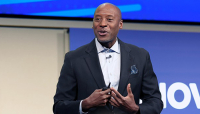Artificial intelligence (AI) has only just started to gain attention in the past few years, but it has also raised a lot of concerns. Elon Musk, who is considered by many to be the greatest innovator of the last two decades, has spoken out about this issue, warning that AI could destroy humanity.
But Reggie Townsend, vice president of data ethics at SAS and one of the leaders on the topic of AI, approaches the topic with optimism rather than impending doom. He acknowledges the downside risks. Every technology comes with its own downsides. Quoting French philosopher Paul Virilio, Townsend said: “When you invent a ship, you invent a shipwreck. When you invent a plane, you invent a plane crash. Every technology has a downside that is invented at the same time as the technology advances.”
But at SAS's Innovate conference this year, Townsend offered a different vision than the one typically talked about. “The most meaningful impact is where we focus on expanding opportunity for all.” He said. “What if AI could strengthen democracy? What if it could accelerate medical advances?”
While Townsend acknowledges that AI poses significant challenges due to its power to commit fraud in various forms, he believes these risks can be overcome, or at least minimized. As his colleague Stuart Bradley explained in an interview with Banking Exchange earlier this year, one of the keys, Townsend said, is collective action by different institutions. “Data is the new oil. Refine, refine and manage its distribution. As one of my professors used to say, 'Show me your work.'” While the general public sees government as less trustworthy, he believes working with governments and businesses to positively influence regulation is a key component to getting the best out of the technology. AI has the ability to actually detect unhealthy biases in data models, for example when decisions are being made based on inaccurate information.
Maybe Elon Musk is right about the dangers of technological innovation, but that has always been the case, and new advances in technology cannot be stopped. As Townsend points out, the real question is whether corporations and governments will mitigate the harms or perpetuate the problem.
For the banking industry, the key with AI is to first harness its potential to mitigate harm in areas like fraud prevention, and then build trust in how it is being used while enhancing efficiencies in areas like data collection.

